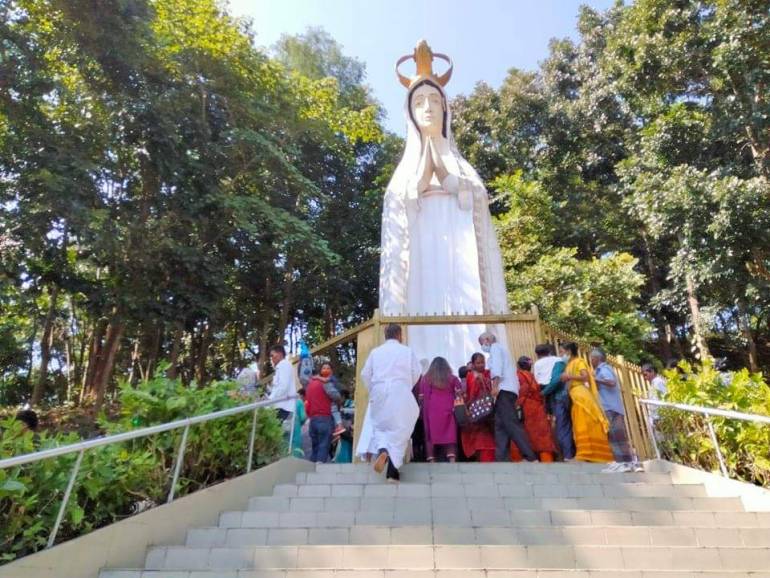Pilgrims invited to "do whatever it takes to unite society"

A Bangladeshi Cardinal called on pilgrims at a Marian shrine "to do whatever it takes to unite the society," calling such actions "a pilgrimage of life."
Bangladeshi Cardinal Patrick D'Rozario said, "Family is a reunion of society, family is a brother-sister society. And the union of man with God is the pilgrimage of our life. … (we must) do whatever it takes to unite society, which will be the pilgrimage of our lives.
Cardinal D'Rozario spoke during an annual pilgrimage held at the Mary Queen of Fatima shrine at Leo's Church in Mymensingh diocese in Bangladesh's northeastern Sherpur district on October 29.
"Today, our message is the love of the family because our family is the smallest shape of the universal Church," Cardinal D'Rozario said.
The shrine in the Garo Hills, near the Indian border, is covered by Mymensingh Diocese, with over 81,000 primarily ethnic indigenous Catholics. It is about 200 kilometers northeast of the capital Dhaka.
The Baromari Mariam pilgrimage is one of the most popular in Bangladesh. The other two are the St. Anthony of Padua shrine in Nagari, Gazipur district, and Our Lady of Lourdes in Diang, Chittagong district. Muslims and Hindus also come to the gathering to offer gifts.
The theme chosen for the pilgrimage was "Fatima Rani Ma Maria in Reunion and formation of Brotherhood."
Father Torun Bonowary, Parish priest of St. Leo's Church, called on "the pilgrims to pray for the peace, unity, harmony and brotherhood … through the intercession of Fatima Rani Ma Maria."
"By celebrating this Mary's pilgrimage, we will also pray for all the sinful people in the world. At the same time, by joining this pilgrimage, we can gain special grace for our own lives through sacrifice, confession and prayer", said Father Bonowary.
The priest who heads the pilgrimage committee invited pilgrims to pray to eradicate the coronavirus from the face of the earth.
Bishop Paul Ponen Kubi of Mymensingh diocese assured the pilgrims that "Mother Mary is with us and She is going with us to our pilgrimage."
Bishop Paul expressed gratitude to all those who join in the pilgrimage, some every year, to express devotion, faith, respect, prayer and love to our Mother Mary.
Joseph Andrew Costa, a pilgrim who joins the annual pilgrimage, said, "Mother Mary is my spiritual Mother in this world. When I came to the pilgrimage, I felt very happy and had inner peace in my life. I prayed to my Mother Mary for a better life for all human beings."
Another Marina devotee, Jasinta Mrong said: "Every year I participate in this Baromari Marian pilgrimage festival because I feel peace in my heart that I don't get when I go anywhere else. That is why our whole family is with me here."
"Actually, this pilgrimage environment is very beautiful. Our family members feel peace in our hearts by praying in front of Mother Mary statues. We pray for ourselves and the whole world," said Mrong.
People from different dioceses of Bangladesh come for the candle-lit rosary prayers, reflections, adoration of the Holy Eucharist, Stations of the Cross on the hill slope, and a special feast day Mass. This year's Marian pilgrimage was attended by over 15,000 people with 35 Priests, four deacons and many nuns from different congregations.
The shrine in Baromari was inaugurated in 1997 in response to Pope John Paul II's call for "pilgrimages of faith" leading up to the anniversary of Jesus Christ's birth in 2000.
Radio Veritas Asia (RVA), a media platform of the Catholic Church, aims to share Christ. RVA started in 1969 as a continental Catholic radio station to serve Asian countries in their respective local language, thus earning the tag “the Voice of Asian Christianity.” Responding to the emerging context, RVA embraced media platforms to connect with the global Asian audience via its 21 language websites and various social media platforms.











